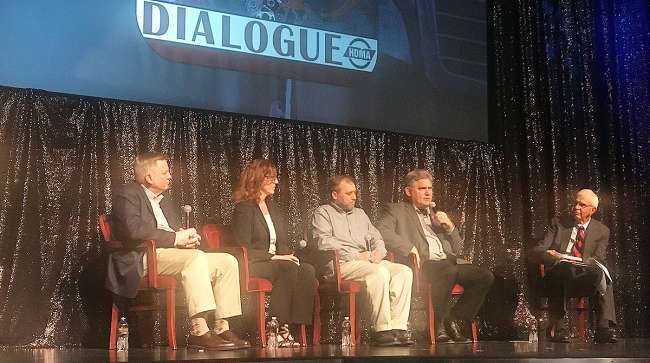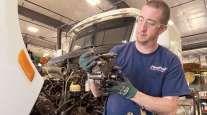Senior Reporter
Fleets Seek Aftermarket Companies That Are Easy to Do Business With

LAS VEGAS — Fleet executives are standardizing parts ordering and maintenance procedures as they deal with truck equipment that is increasingly complex and costly.
They spoke during the Heavy Duty Aftermarket Dialogue that the Heavy Duty Manufacturers Association and consulting firm MacKay and Co. organized the day before Heavy Duty Aftermarket Week opened here Jan. 29.
ALSO AT HDMA: Aftermarket Seeks to Keep Up as Truck Makers Broaden Approach
“We don’t have much black smoke anymore. The trucks are a lot safer, and the fuel mileage is back up to where it needs to be,” said Mike Palmer, vice president of fleet services for Estes Express Lines. “But with that, we have paid the price in terms of the complexity of the equipment and the cost of the components. And having almost 7,000 power units, it gets magnified.”
Estes Express Lines, a Richmond, Va., less-than-truckload carrier, also operates 28,000 trailers. It has 68 service centers and about 600 technicians.
Estes ranks No. 14 on the Transport Topics Top 100 list of the largest for-hire carriers in North America.
Gloria Pliler, director of purchasing for Daseke Inc., agreed that the fuel economy is better. And repairing aftertreatment systems, one of the highest maintenance costs, “is improving.” She noted aftertreatment repairs ran about $900,000 a month at one point, at another large fleet.
“We are seeing less issues with it, but it still remains an issue,” she added.
Daseke includes 22 flatbed and specialty haulers under one corporate umbrella. It has 6,200 tractors and 13,000 trailers. Each company operates and maintains its own equipment.
Daseke ranks No. 29 on the for-hire TT100.
Palmer said Estes has streamlined operations so every service center is doing aftertreatment maintenance the same way.
“We have one or two suppliers that do the cleaning and replacement, and we actually have been doing training with our technicians on that and will continue to do more because we are not at the level we need to be based on the check engine lights,” he said.
Complexity in the equipment has meant there is a greater need for training to ensure the driver understands the technology, said Brett Wacker, vice president of maintenance for truckload carrier Dart Transit Co. “We have had to develop a whole infrastructure over this” supported by the manufacturers.
Dart Transit has 1,750 tractors about evenly split between company drivers and owner-operators, and operates 7,500 trailers.
Dart Holding Co., based in Eagan, Minn., ranks No. 68.
“We can have the best systems in the truck, all this fancy stuff, but if the operator can’t operate it, it means absolutely nothing,” Wacker said. “We have to introduce the driver to the truck and make sure they can demonstrate how to operate these apparatuses.”
Dart named that program Meet Your Truck.
A related issue is ensuring that there are qualified candidates to move up into fleet management. “That next level who’ll come up and take my position,” he said.
Palmer said Estes runs multiple brands of old and new trucks. “It is a big issue” making sure the drivers know how to operate each of the vehicles, including how to shift with a fully manual or automated manual transmission.|
#HDAD19 Parts & Service: The Fleet Perspective is our final session today. Mike Palmer from Estes Express Lines, Gloria Pliler from Daseke, Lee Quinn from Point Ready Mix, and Brett Wacker from Dart Transit will round out another informative HDAD! pic.twitter.com/9bLpLJQBMc — Heavy Duty Manufacturers Association (@HDMADialogue) January 28, 2019
Pliler said Daseke looks for national suppliers and “tries to set up a similar footprint with our shops so that we can manage, either with a direct-ship program or an over-the-counter program through our suppliers.”
When it comes to buying parts, quality is everything, Pliler aid.
“We think high quality is worth the price,” she said.
One of her biggest challenges, Pliler noted, is she doesn’t have the same structure in Canada that she has in the United States.
“I have a lot of options in the U.S., but I would sure like to see some good coverage by our good suppliers in Canada,” she said.
Lee Quinn, maintenance director for Point Ready Mix, which operates 100 ready-mix trucks and has four shops, said the fleet benefits from establishing a close relationship with the aftermarket vendors and dealers it does business with.
“Granted, we don’t have the numbers, but by being loyal and committed we have arranged some good national-account type pricing and availability,” he said.
But he finds a lot of times, parts are back-ordered.
“The ease of business that I can do with you will make the difference on our procurement of parts,” Wacker said.
He looks for availability, quality of the part, price and consistency of delivery. “Do that, and we will continue to buy,” Wacker said.
Receiving a part that was substituted for the one Dart negotiated for would lead him to terminate that vendor, he added.


